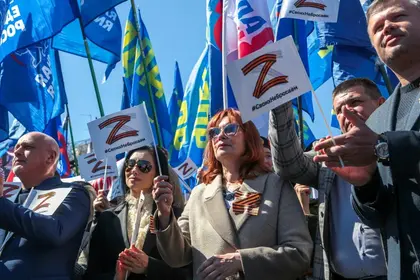Russian civilians who illegally moved from the Russian Federation to Crimea during the occupation will have to leave Crimea after the de-occupation, the permanent representative of the President of Ukraine in the Autonomous Republic of Crimea, Tamila Tasheva, reported.
JOIN US ON TELEGRAM
Follow our coverage of the war on the @Kyivpost_official.
“Everything is simple, and it does not contradict international law,” Tasheva said. “The population that came illegally to the peninsula’s territory should leave the Autonomous Republic of Crimea.”
Tasheva also stated it was not about forced eviction, saying: “It should be a voluntary departure from the territory to which they arrived illegally.” According to her, Russians who entered illegally can submit an official application to the Ukrainian authorities, apply for a resident permit, and name the reasons “why we should give them such an opportunity.”
Tasheva emphasized that “certain measures” should apply not only to the Russian population but also to Ukrainians who have lived in Crimea for the past eight years.
“I don’t mean expulsion, but certain lustration measures” she explained. “All this is related to transitional justice, as defined in United Nations documents, and Ukraine is already working on these issues.”
The permanent representative of the President noted that violators of human rights, war criminals, those who committed crimes against humanity and acts of genocide, would be heavily focused on.

What if Russia Wins?
“Another part of the population that carried out collaborative activities, but did not commit war or other serious crimes, can be subjected to either amnesty or lustration,” she added. “The majority of the population of the peninsula will not carry any responsibility for living there. “They are victims of violations, not violators,” Tasheva emphasized.
In addition, she said that collaborators who held leading positions in the occupation administration would not be subject to amnesty and would be sentenced. Special services collect information about them to transfer to Ukrainian law enforcement agencies and international courts.
During the eight years of the Russian occupation of Crimea, from 600,000 to one-and-a-half-million Russians moved there, and 30,000 Crimean Tatars had to leave the peninsula.
You can also highlight the text and press Ctrl + Enter







